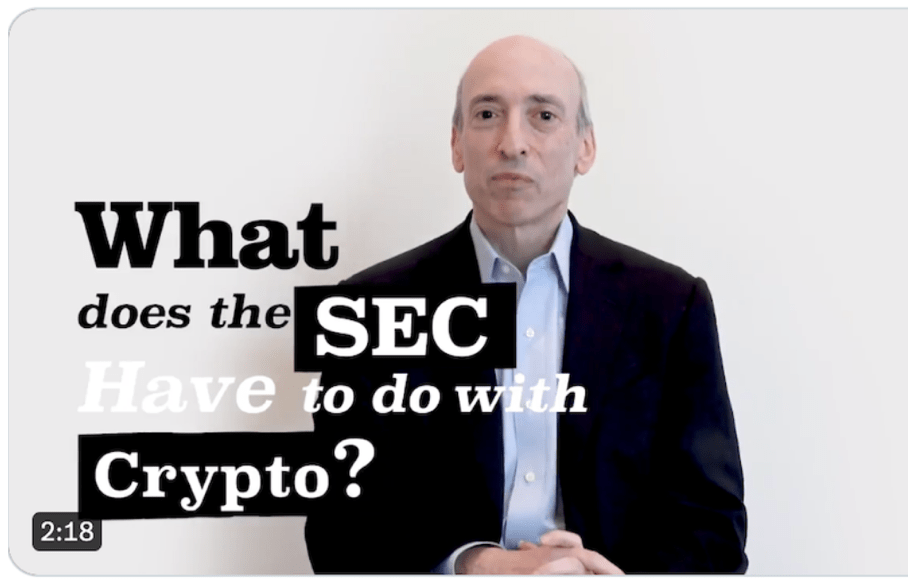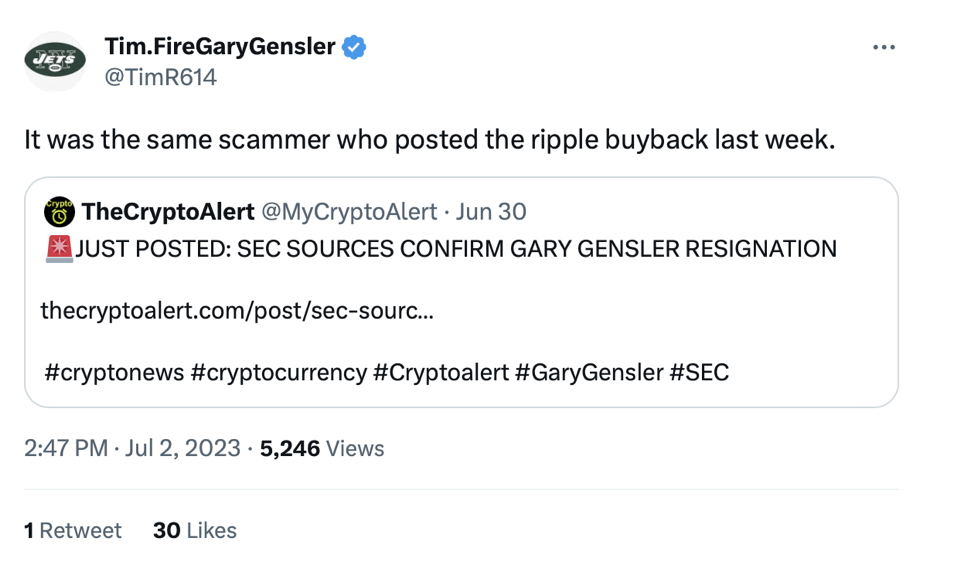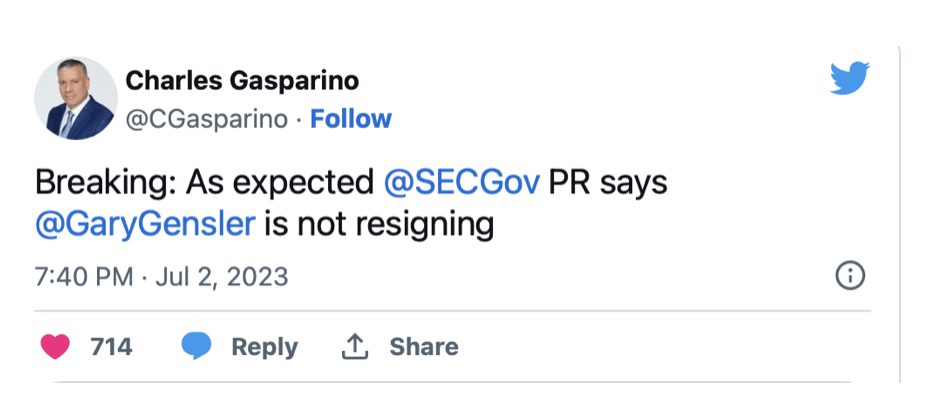Crypto Community Takes Aim at SEC Chair Gary Gensler

As this year’s long Fourth of July holiday began, surprising “news” about Gary Gensler, chairman of the Securities and Exchange Commission, spread across social media. Its source was a blog called CryptoAlert. The headline was an attention grabber: “SEC Sources Confirm Gary Gensler Resignation.” No such move had been announced, or even hinted at, by Gensler or the regulatory agency itself.

The article went on to explain that an “anonymous official” from the SEC had “reportedly disclosed” that Gensler had “submitted his resignation following an internal investigation.” An “anonymous industry insider” weighed in as well, commenting, “The resignation of Gary Gensler in the wake of an internal investigation is deeply concerning. It calls into question the integrity and effectiveness of the SEC under his leadership. The financial industry relies on the SEC to ensure fair and transparent markets, and any allegations of misconduct at the top level erode investor trust.” A third anonymous source noted the importance of accountability in regulatory agencies, adding that he hoped the SEC would address “these issues” swiftly.
The author of the piece says the “exact nature” of Gensler’s alleged misconduct is not known, but has nonetheless “sent shockwaves through the financial industry.” We wonder how that author could have been aware of the industry reaction, given that his was the first information on the subject broken to the public. But to be fair, the news was a bit of a bombshell, as he described it. It hit the social media hard, with special interest shown by the crypto world. It is probably not irrelevant that the article appeared only a few weeks after Gensler announce major enforcement actions against Coinbase and Binance, along with its founder Changpeng Zhao.
CryptoAlert
Some crypto enthusiasts jumped on the story with glee, hoping Gensler would soon be gone. But there was skepticism among many serious observers. CryptoAlert itself is more than a little suspicious. Its domain was created a very short time ago, on June 24. The name of the author of the Gensler story is said to be “Matt Jacob,” too generic to be easily traceable. According to Whois, the registrant, called Crypto Alert, is based in Toronto.
On June 26, only two days after CryptoAlert went live, it published a story titled “Former Federal Reserve Bank VP Recognizes Ripple and Bitcoin.” Exciting stuff! This one was said to be written by Lilly Mackani, and quoted comments made by David Andolfatto, a Canadian who was once Senior Vice President in the research division of the Federal Reserve Bank of St. Louis. Andolfatto had, MacKani noted, “recently” made a statement in which he acknowledged the original ledger technology of Ripple and Bitcoin…” Yet it appears Andolfatto had actually discussed that with CoinDesk eight years ago. So much for fresh news.
That was not CryptoAlert’s only mistake. On July 2, a Twitter poster said dismissively that the Gensler article was the work of the “same scammer” who’d posted news of an unannounced and unrealized Ripple buyback the week before:

That particular Ripple story has disappeared from CryptoAlert’s site. But the Gensler resignation article remains, along with a speculative piece about who might replace him.
By Sunday, July 2, the rumors about Gensler had picked up steam; a crypto publication called U.Today reported that “the XRP community is awash with blatantly fake rumors of the impending resignation of the Securities and Exchange Commission (SEC) Chair Gary Gensler.” Well-known Ripple-XRP proponents warned their followers to try to verify what they shared with their friends and the public generally. We have, it seems, arrived at a place in which “Jungle Inc” and “Crypto Eri” are the voices of reason. A brave new world indeed. Yet Crypto Eri, apparently a woman, checks her information. She said CryptoAlerts was the work of a “loner from Canada” who’d recently removed his personal info from the domain registration for the site.

Why Isn’t Gensler Feeling the Love?
When Gensler arrived at the SEC in early 2021, the crypto community felt optimistic about his appointment. At one time he was seen as being interested in the possibilities offered by coins, tokens, NFTs and more, but as he eased himself into his new job, he seemed to pull back, delaying the creation of new regulations and bringing more enforcement actions than crypto enthusiasts would like.
Sam Lyman explained the changes Gensler’s thought and actions in an excellent article in Forbes: “From Ally to Adversary: The 3 Stages of Gary Gensler’s Crypto Evolution.” After Gensler ended his tenure as head of the Commodity Futures Trading Commission (CFTC), he did some work in his home state of Maryland, and then moved into academe, teaching at MIT’s Sloan School of Management. There, he taught a popular Blockchain and Money course. Early on, he seemed inclined to think cryptocurrencies were not securities, but by 2018, he gave a lecture in which he addressed the question of whether cryptocurrency is a security or a commodity. His answer was: “It’s both. I know that’s not an answer that a lot of people like, but that’s kind of where we are right now.”
A year later, according to lawyers at Binance, he offered to advise the exchange, and even had a meeting with its founder, Changpeng Zhao, in Japan. Gensler himself has never denied the meeting took place, though he’s never discussed it. In 2020, Joe Biden won the presidential election. It was believed he’d appoint Gensler chairman of the SEC, and there was an expectation Gensler would be “pro-innovation,” which is to say he’d be a friend to crypto developers. Republican Senator Cynthia Lummis, who together with Democratic Senator Kirsten Gillibrand has been working on sweeping crypto legislation, tweeted at the time of Gensler’s nomination, “While the SEC has a reputation as a black hole for innovators, Gary Gensler recognizes the potential of digital assets.”
Good times were coming for crypto, the industry believed. But once he took office, Gensler’s attitude began to change. He called crypto a “Wild West” full of fraud and abuse, and suggested that a great many tokens may be unregistered securities. He clearly felt more and better regulation was needed, urging Congress to come up with helpful legislation, because “exchanges trading in these crypto assets do not have a regulatory framework either at the SEC, or our sister agency, the CFTC.” By 2022, Lyman shows, Gensler had become more adversarial, saying, “Of the nearly 10,000 tokens in the crypto market, I believe the vast majority are securities.” In November, his concern was validated when Sam Bankman-Fried’s FTX and its affiliate Alameda Research collapsed. That, in turn, raised questions about the stability of crypto giants like Crypto.com and Binance, who’d had extensive dealings with FTX. The fallout is still being felt in mid-2023.
Regulation by Enforcement
Congress hasn’t yet delivered on legislation that could help with crypto regulation. The SEC hasn’t advanced any crypto regulations of its own. It’s still largely stuck trying to decide whether coins, tokens, and other forms of crypto are securities or commodities. Backing away from his earlier stance on that question, Gensler told New York Magazine he now believes that “everything other than bitcoin” is a security. If so, all those coins and tokens will have to be registered, and the exchanges on which they trade will have to register with the SEC as well. Needless to say, thi s is not good news for most crypto players.
One of Gensler’s in-house critics is Hester Peirce, a fellow SEC Commissioner. She’s long been a strong supporter of the crypto industry, and many of her admirers call her “Crypto Mom.” She has a quirky sense of humor, and in her many SEC speeches and statements, she speaks her mind. She feels the SEC has been unfair to people in the industry. They come to the agency and ask: “Tell me the rules. We’ll figure out how to comply.” But there are no rules. So they do what they do, and if they do it wrong, they’ll find themselves the subjects of an enforcement action, with a big fine to pay. Peirce doesn’t believe that’s fair. She respects Gensler, and believes he knows a great deal about crypto. They need, however, to come together on the need for regulation.

There’s something else that’s made Gensler’s life more difficult this year. The Democrats have lost control of the House of Representatives, and Republican members of the Financial Services Committee are not pleased. At the end of April they called him in to testify before them, and they seem to have enjoyed themselves:
Today, the Republicans on the House Financial Services Committee held Securities and Exchange Commission (SEC) Chair Gary Gensler accountable for his disastrous agenda that threatens the dominance of U.S. capital markets and our competitiveness. As Chair Gensler repeatedly obfuscated and attempted to dodge questions, Republicans continued to force him to answer for his reckless rulemaking agenda, regulation by enforcement of the digital asset ecosystem, and disregard for the capital formation piece of the SEC’s statutory mission.
Not surprisingly, a number of the committee members are very big supporters of everything crypto. They’d like to see an entirely new asset class created: “digital commodities.” Their creation would rid the committee of the troublesome Gensler, becauuse the digital commodities would be regulated by the CFTC, not the SEC. They feel Gensler is on the one hand delaying the development of a robust crypto investment sector in this country, and on the other, failing to engage in sufficient oversight of companies like Bankman-Fried’s FTX. Some go so far as to insinuate that Gensler was up to no good with Bankman-Fried himself.
One way or another, Gensler and the committee will be speaking again. On June 2, members submitted a “discussion draft” of “legislation providing a statutory framework for digital asset regulation intended to provide clarity, fill regulatory gaps, and foster innovation, while providing adequate consumer protections.” The bill will likely need a lot of work before it’s ready to be voted on.
But that’s not all. In early June, House Majority Whip Tom Emmer, a big crypto guy, joined in support of Warren Davidson’s proposed SEC Stabilization Act, a bill aimed at firing the “tyrannical” Gensler, and reducing what they believe to be the chair’s excessive power.
SEC v. Ripple Labs
As if Gensler didn’t have enough on his plate, when he arrived at the SEC, he inherited significant crypto litigation, in the form of a complicated suit against Ripple Labs, filed in December 2020. According to the complaint, Ripple, a blockchain developer, and two of its executives, Christian Larsen and Bradley Garlinghouse, were charged with conducting a $1.38 billion unregistered securities offering that extended over a period of seven years. The securities in question were more than 14.6 billion units of a digital asset security called “XRP.” Larsen and Garlinghouse had received a legal opinion in 2012 telling them that “under certain circumstances XRP could be considered an ‘investment contract’ and therefore a security under the federal securities laws,” but they disregarded it. Over the relevant period, the company raised at least $1.38 billion. Some of the money was used to fund its operations, but Larsen and Garlinghouse kept about $600 million for themselves. XRP had been the brainchild of Larsen, who created it with the help of a cryptographer in late 2011 or early 2012. It was not designed to have a “use,” at least at the outset. It was created simply for investment purposes.
The importance of the action has nothing to do with Ripple or with XRP. Yet its outcome will be significant: as it determines whether or not XRP is a security, it will determine whether the SEC will go forward as the chief regulator of crypto. Along with that, a great many other digital assets will need to be registered as securities.
More than 75,000 people hold XRP, so there’s no shortage of interested parties, and most of them don’t like Gary Gensler.
That’s ironic, because Gensler has little to do with the Ripple case. It was investigated for at least several years, and filed months before he arrived at the SEC. But at least for the crypto world, he can do nothing right. Crypto-crazy congressmen don’t like him. Not even snippy chatbots like him.
There must be times he longs to return to the relatively quiet life of a teacher and researcher at MIT. John E. Deaton, a pro-XRP attorney who’s written an amicus brief in the Ripple case thinks that although the holiday resignation story was a false alarm, it’s possible that Gensler will make his departure in the fairly near future. Deaton sees him as a liability for the Democrats in the upcoming election year, and believes his (real) resignation would be give U.S. based crypto companies a much-needed boost. But Gensler seems to have a long list of things he wants to accomplish. Maybe he’ll stick around.
To speak with a Securities Attorney about penny stock bars, please contact Brenda Hamilton at 200 E Palmetto Rd, Suite 103, Boca Raton, Florida, (561) 416-8956, or by email at [email protected]. This securities law blog post is provided as a general informational service to clients and friends of Hamilton & Associates Law Group and should not be construed as and does not constitute legal advice on any specific matter, nor does this message create an attorney-client relationship. Please note that the prior results discussed herein do not guarantee similar outcomes.
Hamilton & Associates | Securities Attorneys
Brenda Hamilton, Securities Attorney
200 E Palmetto Rd, Suite 103
Boca Raton, Florida 33432
Telephone: (561) 416-8956
Facsimile: (561) 416-2855
www.SecuritiesLawyer101.com






